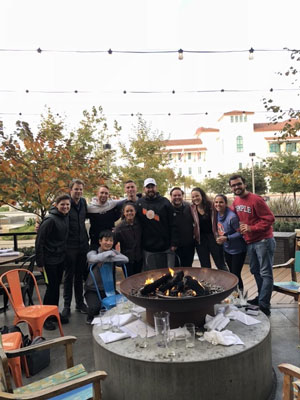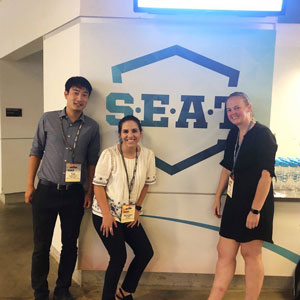SMBA 20 Graduate Q&A: Takuya Matsumoto
At the end of May, the SDSU Sports MBA program within the Fowler College of Business held its virtual graduation celebration for the Class of 2020. Congratulations to the future sports business professionals in the graduating class!
Takuya Matsumoto, a Class of 2020 SMBA graduate, came to the Sports MBA program from Tokyo where he was working in the software industry. The SDSU Fowler News Team interviewed him about his graduate school journey, why he chose to enroll in SDSU's Sports MBA program and how a guest speaker and SMBA alum helped him start a career with KORE Software.
Q: Tell us a little bit about yourself, where are you from and where did you get your undergrad degree?
I was born in New Jersey but grew up in Japan, France and Sweden. I attended high school in Tokyo, Japan and stayed there for undergrad where I attended International Christian University and majored in Economics. After graduation, I moved to Los Angeles where I worked as a sales associate for two years in the food industry. After that, I moved back to Tokyo where I worked in the software industry for over three years.
Q: How/when did you decide to pursue a Sports MBA degree at San Diego State?
After working for five years in the food and software industries, I realized that I wanted a new challenge to at least try to make it in the sports industry. I started looking for programs that aligned with what I was looking for which was a rigorous program that incorporated some work experience in order to graduate. I also didn’t want to be out of the workforce for too long and that’s when I found the Sports MBA program at SDSU.

Takuya Matsumoto with the SMBA Class of 2020.
Q: Do you have a favorite memory from your time within the Sports MBA program?
There were a lot of great memories from this program with the trip to the Dominican Republic at the top of the list. But I think what I will always cherish are the professors, administrators and especially the other students in the cohort that made everything possible.
Q: What was your favorite class and/or favorite professor and why?
I enjoyed a lot of the classes, but Organizational Behavior and Finance stood out to me. I really enjoyed Organizational Behavior because it looked at organizations from a human and cultural perspective which I think is extremely important. I liked the two Finance courses since it was very applicable to anyone regardless of whether you end up in a Finance department or not since everyone has to manage their own money.
Q: The Sports MBA program is known for its industry guest speakers. Was there one or more that really stood out to you?
There were so many amazing guest speakers but there were two that I really enjoyed.
- Shana Ferguson (SMBA ‘07), Chief Commercial Officer at USA Swimming for her passion and her willingness to really get to know all of us and making it interactive, allowing us to get a better understanding of what it takes to work in the industry.
- Jack Tipton (SMBA ‘06), Senior Director of Partnership Sales at Pittsburgh Penguins came in and explained his journey after the program. His presentations were extremely engaging and his honesty about what it takes to make it in the sports industry was very informative.
Q: The Sports MBA program is also known for its robust network of alumni. Are there program alumni from whom you remember getting good advice or who have really helped guide you or impacted your career?
There are too many to choose from and every one of the alumni I talked to gave me a different perspective on how to go about entering the sports industry. I appreciated all of their time and there were a couple of themes around their advice. One is the importance of networking and reaching out to people to get a better understanding of what types of jobs there are out there. The other is that what you put into the program is what you get. The first part of the program in San Diego is only 3 semesters in total, so you have to make the most of it. Sometimes the amount of class work can be overwhelming but try to always remember why you decided to pursue the degree in the first place.
Q: You were able to volunteer for several local sports events while in the program. Did you have a favorite event? If so, why did it stand out?
A local event that I feel like I got the most out of was working with the San Diego Legion (Rugby) at all their home games. Since it happened multiple times, I was able to get a better understanding of what goes into planning games from an operational perspective.
My favorite event that I volunteered for was the SEAT conference. It was in Daytona, Florida so it was a bigger commitment than other volunteering opportunities, but it was an amazing experience. The event is full of people working for vendors and different sports organizations. The best part was that the attendees were extremely open about talking to students. I met a lot of great people and some of them ended up becoming my colleagues.
Q: Why should others consider the Sports MBA program when looking at graduate programs?
While being in San Diego definitely helps, this program gives you a unique experience of receiving an MBA with an emphasis in sports business. What this means is that you take all the necessary MBA courses but all the projects and examples in class are focused on the sports industry. It is also an accelerated program so while it is highly demanding, you finish the majority of your classes in 3 semesters which gives you an opportunity to get back into the workforce quickly. Additionally, the last semester requires you to get a full-time position and do a project for that organization outside of your working hours. This really helps to bolster your resume or if you already have a full-time position, gives you an opportunity to present and be noticed by the upper management.

Takuya Matsumoto with Morgan Pefanis (SMBA '20) and Aileen Berran (SMBA '11) at the SEAT Conference.
Q: Any advice you would have for current and/or future Sports MBA Students about making the most of their time here?
Classes are important but I would say keep your focus on figuring out what you want to do. This can be through networking and reaching out to people to learn about their jobs or volunteering at events to get a better sense of how everything is executed. Also use the class projects as an opportunity to learn more about what you are interested in. Even if along the way, all you find are things that might not interest you, it will help you narrow your research as you look for a job.
Q: Describe your current position.
I currently work as a Success Associate at KORE Software. The company sells software primarily to sports organizations. The software helps manage the business side of sports and I work in a department where our main role is to make sure the clients are happy and assist them on how to best use the software.
Q: How did you acquire this position?
I first heard about this company through one of the guest speakers. I connected with the guest speaker and spoke with few of her colleagues. I was even able to meet with one of them at a conference where I was a volunteer. Jackson Dargan (SMBA ‘18) also works at the company and really helped me get a better understanding of what the company does. Initially, I had no idea what I wanted to do but the more I researched about different opportunities in the sports industry, the more I wanted to be on the vendor side and work with multiple sports organizations. I was constantly looking for client facing positions at the company and when there was an opening, I reached out to people that I had connected with earlier on in the year.
Q: Are there specific skills you learned through the Sports MBA program (in class or otherwise) that helped you with the role’s qualifications?
I knew a little bit about CRM systems such as Salesforce but throughout the program I took online courses that they had offered. We learned how to use Tableau in the Decision Support Systems class which is one of the ways the KORE software can visualize data. Through our Business Strategy class, we learned how to analyze a company which is what I did to research organizations to prepare for interviews. There were many other skills that I learned through the course that helped but I think the most important one was being proactive about reaching out to people. Sometimes it’s difficult to reach out to strangers but through this program and talking to alumni, it is the best way to find jobs in this industry.
Q: Any advice to future SMBA students who are looking to acquire a position similar to yours?
If it is a company like KORE that utilizes CRM a lot, I would recommend taking online courses that Salesforce offers called Trailhead. I would say that all professional sports organizations in North America use some sort of CRM system so learning about one of the most famous CRM systems will help you understand the benefits and how it is structured.
Q: What is it that you are most looking forward to as you kick start this next chapter in your career?
After six and half years since receiving an undergraduate degree, I finally managed to enter the industry of which I had always wanted to be a part of. It still seems surreal at times but what I am most looking forward to is establishing myself at the company and developing relationships across the industry. In a time like this where the pandemic has severely impacted the industry, I am also excited to see the different creative strategies sports organizations take to endure this difficult period.
About the SDSU Sports MBA Program:
The SDSU Sports MBA program is an intensive, accelerated MBA degree focused on the dynamic business of international sports. The program provides its graduates a thorough understanding of the skills crucial for professionals to succeed, while building a broad network of relationships in the sports-rich landscape of Southern California. Visit business.sdsu.edu/sportsmba to learn more, request information or apply to the Sports MBA program.

